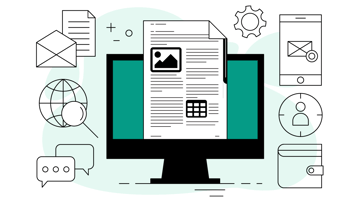In competitive procurement environments, well-written bids can be the deciding factor between winning contracts or falling short. Effective bid writing is more than clear language and proper formatting—it’s about persuasion, structure, and alignment with the buyer’s goals.
This guide provides actionable bid writing tips, proven techniques for successful bid writing, and insights to improve your chances of winning in today's complex bidding landscape.
Recommended: What is bid management?
Successful Bid Writing Starts with Preparation
Every effective bid starts before the first word is written. Strong proposals are built on planning, internal alignment, and a clear understanding of the buyer's expectations.
Before writing:
- Review the request for proposal (RFP) thoroughly.
- Clarify the scope of work and project objectives.
- Identify the evaluation criteria and scoring methodology.
- Determine your key differentiators.
This process ensures your content speaks directly to buyer priorities, reduces revision cycles, and strengthens your position.
Tailoring Your Proposal to the Project
One of the most important bid writing tips is to avoid using generic content. Every proposal should be tailored to the specific opportunity—not just to stand out, but to make your proposal stand out as the most relevant and lowest-risk option.
To personalize effectively:
- Mirror the buyer’s language and tone.
- Reference their strategic goals or recent initiatives.
- Include relevant case studies or examples that reflect similar scopes of work.
- Align your value proposition with their success metrics and KPIs.
Winning bids often come down to attention to detail. Evaluators notice when you’ve clearly shaped your proposal around their needs, challenges, and expectations. That level of care builds credibility—and it helps secure the winning bid.
Use Evaluation Criteria as a Framework
Your bid should be shaped by how it will be evaluated. The evaluation criteria should guide both structure and emphasis.
If the RFP prioritizes methodology, highlight your approach early. If social value or sustainability carries weight, dedicate space to measurable impact.
Make it easy for evaluators to locate the information they need. Use clear headings, direct language, and answer each requirement in turn.
Treat Word Count as a Strategic Tool
Rather than viewing word count as a constraint, use it as a tool for clarity and focus. Each sentence should contribute directly to your message.
A strong structure might include:
- A clear statement of your approach or result.
- Supporting detail or evidence.
- A benefit to the buyer or end-user.
Clarity and conciseness are essential traits of effective bid writing.
Think Like a Bid Manager
Writing is only one part of the bidding process. Coordination, timelines, and version control are just as critical.
To stay organized:
- Identify all contributors early.
- Define internal deadlines.
- Allow time for quality reviews.
- Maintain a clear versioning system.
Missed inputs or overlooked requirements can affect compliance. Treat the bid process as a managed project.
Ensure Compliance Before Submission
Even the best-written proposals can be disqualified if they don’t meet submission requirements. Before submitting a bid, verify:
- All requested documents and forms are included.
- File formats and naming conventions match RFP guidelines.
- Page or word limits are followed.
- All declarations and signatures are in place.
A non-compliant bid may not be reviewed, no matter how strong the content.
Build Confidence Through Evidence
Support every claim with evidence. This could include:
- Case studies showing successful delivery.
- Client testimonials or endorsements.
- Metrics tied to performance or impact.
- Team bios aligned to the required capabilities.
This builds credibility and lowers perceived risk for the buyer.
Balance Technical Detail with Readability
Many bid proposals fail not because of weak solutions—but because reviewers struggle to understand them. Technical excellence is essential, but it must be accessible.
Avoid overwhelming evaluators with jargon or dense blocks of text. Instead, aim to translate complex concepts into business value. Explain how your technical approach solves real problems, aligns with the buyer’s goals, and reduces delivery risk.
Use formatting and structure to improve clarity:
- Bullet points to outline steps, processes, or deliverables clearly.
- Tables or visuals to compare features, highlight benefits, or display timelines.
- Defined terms or abbreviations, with a glossary if needed.
A technically strong proposal still needs to stand out. The easier it is to navigate and score, the more likely it becomes a winning bid—especially when evaluators are working under tight time constraints.
The best proposals are readable, relatable, and results-driven.
Elevate Your Executive Summary
The executive summary is often the first—and sometimes only—section decision-makers read.
Use this space to:
- Reiterate the project’s purpose.
- Emphasize your differentiators.
- Highlight key results and benefits.
- End with a confident, forward-looking close.
This section sets the tone and frames the value of your proposal.
Demonstrate Timeline Ownership
Don’t just promise timely delivery—show how you’ll achieve it. Many strong bid proposals fall short in this area by making vague timeline commitments without backing them up.
To improve trust and evaluation scores:
- Include a clear, high-level project timeline with key stages.
- Outline key deliverables, review gates, and handoff points.
- Show how you manage dependencies, especially in multi-party environments.
- Add evidence from past projects where deadlines were met or accelerated.
Bidders who take ownership of project timelines—not just in theory, but in practice—demonstrate maturity and control. That signals to evaluators that you’re not only ready to win, but ready to deliver.
Personalization Without Guesswork
Tailoring your proposal doesn’t mean making risky assumptions. It means using available information strategically to show alignment with the buyer.
You can personalize by:
- Citing information from the buyer’s website, ESG reports, or strategy documents.
- Referencing phrases used in the RFP itself.
- Addressing known industry challenges or sector-specific trends.
- Proposing delivery models that reflect the buyer’s environment.
The aim is to create a response that feels familiar and intentional—one that resonates without overstepping.
Use Proof to Back Every Claim
Effective bid writing is proof-driven. Instead of simply stating you can do the work, prove it with data and past performance.
Strong forms of proof include:
- Quantified outcomes from similar projects.
- Endorsements from satisfied clients.
- Certifications, standards, or accreditations.
- Success rates for comparable bids or contracts.
Each piece of proof improves your credibility and strengthens your scoring potential.
Collaboration Tools Enhance Proposal Quality
Modern bid writers and bid managers often juggle inputs from SMEs, finance teams, legal advisors, and operational leads. Manual processes like versioned Word docs and email chains can lead to errors or missed content.
Collaborative tools and bid management software can help teams:
- Work on documents simultaneously.
- Access shared content libraries.
- Track changes and maintain formatting consistency.
- Automate workflows, reminders, and approvals.
Platforms like XaitPorter and XaitProposal are designed to support these capabilities—helping teams submit bids that are not just compliant, but polished and professional.
Use the Final Review to Stand Out
Before submitting a bid, use your final review pass to polish—not just proofread.
Look for opportunities to:
- Strengthen opening and closing statements.
- Ensure tone is confident and customer-focused.
- Highlight your competitive differentiators.
- Replace passive phrasing with active outcomes.
This final sweep isn't just about fixing typos—it’s about leaving a lasting impression.
Keep the Buyer’s Experience in Mind
Your proposal should not only answer the RFP—it should be easy and even enjoyable to read. Think of the evaluator’s perspective:
- Is the structure intuitive?
- Are key messages clear at a glance?
- Can they quickly locate answers to scoring criteria?
The easier you make their job, the more likely they are to reward your effort.
Bid Writing Is a Competitive Advantage
Organizations that invest in effective bid writing and repeatable processes win more work. Period.
Why?
Because they:
- Reduce errors and omissions.
- Improve their success rate over time.
- Submit bids that are confident, clear, and compliant.
- Scale their bidding efforts without sacrificing quality.
This is where good writing becomes great strategy.
By following these bid writing tips and building habits around structure, clarity, and persuasion, your team can consistently produce successful bids—even in the most competitive industries.











